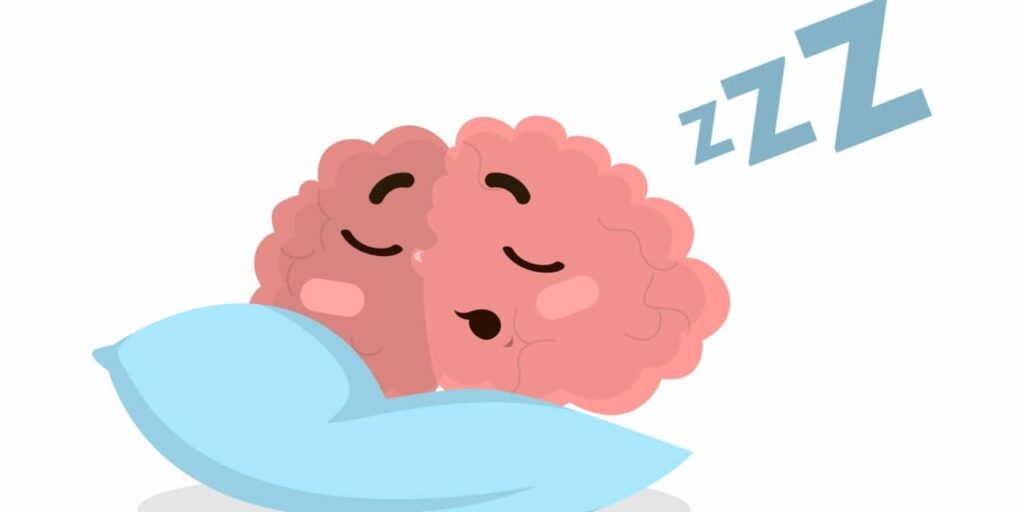Table of Contents

Introduction for Effects of Sleep Loss on Brain
In today’s fast-paced, technology-driven world, the importance of sleep is often overlooked. Many of us sacrifice precious hours of slumber for additional work, social engagements, or late-night entertainment, underestimating the profound impact that this has on our bodies and minds. Yet, the truth is that sleep is not a luxury; it is as crucial to our well-being as the very air we breathe, the water we drink, and the food we consume.
The silent yet pervasive health crisis of sleep deprivation is a topic that deserves our attention. According to the National Sleep Foundation, approximately 35% of adults in the United States are sleep deprived, getting less than the recommended seven to nine hours of sleep each night. Chronic sleep loss is not merely a nuisance that leaves us feeling groggy and sluggish; it has the power to rewire our brains in ways that are fundamentally detrimental to our cognitive, emotional, and physical health.
This comprehensive blog post is dedicated to exploring the intricate relationship between sleep and brain health. Through a detailed examination of the consequences of sleep deprivation, we aim to shed light on the value of restorative sleep and encourage readers to make it a priority in their lives.
Section 1: The Vital Role of Sleep in Brain Health
Before delving into the profound effects of sleep deprivation, it is essential to understand the multifaceted role that sleep plays in the maintenance and enhancement of our brain function. Sleep is not a passive state of rest; rather, it is an active period during which the brain and body undergo critical processes that are vital for our overall well-being.
The Science Behind Sleep
When we enter the realm of sleep, our brains and bodies embark on a journey through a series of complex physiological changes. These changes are orchestrated by the circadian rhythm, our internal biological clock that regulates our sleep-wake cycle. During this time, numerous essential activities take place that contribute to our cognitive, emotional, and physical health.
Memory Consolidation
One of the most significant roles of sleep is in the consolidation of memories. Throughout the day, our brains are bombarded with a vast array of information, which is initially stored in the hippocampus, a temporary holding area. As we sleep, this information is processed and transferred to the neocortex, where it is integrated into our long-term memory. This process is critical for learning and retaining new skills.
Detoxification
During sleep, the brain’s glymphatic system is activated, which is responsible for clearing waste and toxins, such as beta-amyloid proteins. These proteins are associated with neurodegenerative diseases like Alzheimer’s. The efficient removal of these harmful substances is essential for maintaining brain health and preventing cognitive decline.
Hormone Regulation
Sleep plays a critical role in the regulation of hormones that control our appetite, stress levels, and growth. The hormone leptin, which signals satiety, and ghrelin, which stimulates hunger, are both affected by our sleep patterns. Moreover, the growth hormone, which is essential for the repair and rebuilding of tissues, is released during deep sleep, contributing to muscle repair and overall physical recovery.
Emotional Processing
The rapid eye movement (REM) stage of sleep is particularly important for emotional processing. During this stage, our brains process and regulate emotions from the day’s events. This is crucial for our mental health, as it allows us to cope with stress and trauma more effectively.
The Sleep Cycle
Sleep is divided into several distinct stages, each with its unique purpose and contribution to our overall well-being. A typical sleep cycle lasts 90 to 110 minutes and consists of the following phases:
NREM (Non-Rapid Eye Movement) Stage 1: This is a transitional phase between wakefulness and sleep, characterized by a decrease in brain wave activity.
NREM Stage 2: The body begins to prepare for deep sleep. The heart rate slows, and the core temperature drops.
NREM Stage 3 (Deep Sleep): This is the most restorative stage of sleep, essential for physical recovery and bolstering the immune system.
REM Sleep: Known for its vivid dreams, REM sleep is vital for cognitive functions, including learning, memory, and creativity.
It is crucial to experience each of these stages in their entirety to reap the full benefits of a good night’s rest.


Section 2: The Staggering Impact of Sleep Loss on Brain Function
Chronic sleep deprivation can lead to a cascade of negative consequences that affect our brain health. Below are seven of the most concerning effects:
- Cognitive Impairment
Sleep is essential for cognitive performance. Depriving the brain of sleep leads to a decline in the ability to think, learn, and remember.
Memory Formation: The hippocampus, a region of the brain responsible for memory consolidation, relies heavily on adequate sleep to function optimally. Sleep-deprived individuals often struggle with recalling information and retaining new knowledge.
Attention Deficit: The capacity to focus and maintain attention is significantly compromised without enough sleep. Studies have shown that sleep deprivation can mimic the effects of alcohol intoxication, with performance levels comparable to having a blood alcohol content of 0.08%.
Problem-Solving Declines: Tasks requiring complex problem-solving and rapid decision-making become increasingly challenging when we are sleep-deprived.
Real-World Example:
The tragic events of the 1989 Exxon Valdez oil spill serve as a stark reminder of the consequences of sleep deprivation. Investigations revealed that the crew navigating the vessel was significantly sleep-deprived, leading to poor judgment and delayed response times that contributed to the disaster.
- Emotional Instability
Loss of sleep can disrupt the delicate balance between our brain’s emotional and rational centers, resulting in a heightened susceptibility to mood swings and irrational behavior.
Amygdala Overactivation: Chronic sleep deprivation can cause the amygdala, the brain’s center for processing fear and aggression, to become hyperactive. This can lead to exaggerated emotional responses and difficulty managing stress.
Prefrontal Cortex Suppression: The prefrontal cortex, which is responsible for impulse control and rational thought, is less active when we are sleep-deprived. This can result in poor emotional regulation and impulsivity.
Scientific Evidence:
Research conducted at the University of California, Berkeley demonstrated that individuals who had not slept well exhibited 60% stronger emotional reactions to negative stimuli compared to their well-rested counterparts.
- Mental Health Risks
Sleep deprivation is closely linked to an increased risk of developing mental health disorders:
Depression: Chronic sleep loss can lead to a decrease in serotonin levels, which are associated with depression. Moreover, insufficient sleep can exacerbate existing depressive symptoms.
Anxiety: Lack of sleep can intensify the brain’s stress response, leading to heightened anxiety levels.
Bipolar Disorder: Sleep disturbances are a common feature of bipolar disorder and can trigger manic episodes.
Long-Term Consequences:
The relationship between sleep and mental health is bidirectional. Sleep deprivation can contribute to the onset of mental illness, while the presence of mental health issues can lead to poor sleep quality, creating a detrimental cycle that can be challenging to break.
- Impaired Creativity and Learning
Sleep is not only crucial for cognitive functions but also plays a pivotal role in fostering creativity and learning.
REM Sleep and Creativity: During REM sleep, the brain has the opportunity to make connections between disparate pieces of information, which can lead to innovative thinking and problem-solving. A deficiency in this stage can stifle creativity and hinder the ability to generate novel ideas.
Learning Plateaus: Individuals who do not get enough sleep may find that their capacity for learning reaches a plateau, with limited progress in new skills and knowledge despite their efforts.
Real-Life Inspiration:
Paul McCartney famously attributed the melody for The Beatles’ hit song “Yesterday” to a dream he had during REM sleep. This anecdote underscores the importance of restorative sleep in fostering moments of creative insight.
- Enhanced Susceptibility to Neurological Disorders
Chronic sleep deprivation can increase our risk for various neurological conditions:
Alzheimer’s Disease: Sleep is critical for the clearance of beta-amyloid plaques, which accumulate in the brains of those with Alzheimer’s. Disrupted sleep patterns may contribute to the development of this debilitating condition.
Parkinson’s Disease: Sleep disturbances often accompany Parkinson’s disease, and poor sleep can exacerbate motor and cognitive symptoms.
Stroke: Sleep deprivation can elevate blood pressure and inflammation levels, which are significant risk factors for stroke.
- Compromised Decision-Making and Risk-Taking Behavior
Sleep loss can impair judgment and increase impulsivity.
Risky Financial Decisions: Sleep-deprived individuals are more prone to making hasty, ill-advised financial choices due to impaired decision-making abilities.
Accident Proneness: Fatigue and poor judgment can lead to an increased likelihood of accidents in various contexts, from driving to operating heavy machinery.
Unhealthy Lifestyle Choices: Lack of sleep often results in poor dietary choices and reduced physical activity, contributing to weight gain and the development of chronic diseases.
Real-World Implications:
Sleep-deprived individuals might engage in behaviors they would otherwise avoid, such as indulging in excessive junk food or taking unnecessary risks that could impact their health and well-being.
- Long-Term Brain Damage
Prolonged sleep deprivation can lead to irreversible harm to the brain:
Neuron Loss: Research in mice has shown that chronic sleep deprivation results in the death of neurons in the locus coeruleus, a brain region associated with arousal and mood regulation.
Reduced Brain Volume: MRI studies have revealed that individuals who consistently fail to get enough sleep have smaller prefrontal cortexes, which can affect executive functions such as decision-making and problem-solving.
Section 3: Understanding the Causes of Sleep Deprivation
To effectively combat sleep loss, it is imperative to recognize and address its underlying causes:
Technology Overuse: The blue light emitted by electronic devices can interfere with the production of melatonin, the hormone that regulates our sleep-wake cycle, making it harder to fall asleep and stay asleep.
Stress and Anxiety: A racing mind and high cortisol levels can prevent us from achieving deep, restorative sleep.
Poor Sleep Hygiene: Factors such as irregular sleep schedules, excessive caffeine consumption, and uncomfortable sleep environments can all disrupt our natural sleep patterns.


Section 4: Strategies for Enhancing Sleep Quality
Creating a conducive sleep environment and establishing a consistent routine can significantly improve sleep quality:
Establish a Sleep Routine: Going to bed and waking up at the same time each day helps regulate the body’s circadian rhythms.
Limit Screen Time: Avoid using electronic devices at least an hour before bed to reduce exposure to blue light.
Optimize Your Sleep Environment: Invest in blackout curtains, white noise machines, and comfortable bedding to create a restful space.
Other practical steps include:
Exercise Regularly: Physical activity can promote better sleep quality.
Mindfulness Practices: Techniques like meditation and deep breathing can help reduce stress and prepare the mind for sleep.
Maintain a Dark, Cool Environment: These conditions are conducive to a good night’s sleep.
Avoid Caffeine and Alcohol: Both substances can disrupt sleep patterns.
Section 5: The Far-Reaching Effects of Sleep Deprivation
The impact of sleep loss extends beyond the individual to affect society at large:
Economic Costs: The loss of productivity resulting from poor sleep is estimated to cost the U.S. economy billions of dollars annually.
Healthcare Strain: Sleep disorders contribute significantly to the burden of chronic diseases, leading to increased healthcare expenditures.


Conclusion
The evidence is unequivocal: sleep is a fundamental pillar of brain health. Chronic sleep deprivation is not a mere personal issue but a societal challenge with far-reaching implications. By acknowledging the alarming effects of sleep loss and implementing strategies to improve sleep quality, we can take substantial steps toward safeguarding our cognitive and emotional well-being. It is time we give sleep the respect and priority it deserves, recognizing that it is not merely an afterthought but a vital component of a healthy and productive life.
In summary, this blog post has elucidated the critical role of sleep in maintaining and enhancing brain health, highlighted the dire consequences of chronic sleep deprivation, and provided actionable steps to ensure that we all get the restorative rest we need. Sleep is not a luxury to be sacrificed at the altar of productivity; it is an essential biological need that must be prioritized if we are to thrive in an increasingly demanding world.
Effects of Sleep Loss on Brain Effects of Sleep Loss on Brain Effects of Sleep Loss on Brain Effects of Sleep Loss on Brain Effects of Sleep Loss on Brain Effects of Sleep Loss on Brain Effects of Sleep Loss on Brain Effects of Sleep Loss on Brain
Effects of Sleep Loss on Brain Effects of Sleep Loss on Brain Effects of Sleep Loss on Brain Effects of Sleep Loss on Brain Effects of Sleep Loss on Brain Effects of Sleep Loss on Brain Effects of Sleep Loss on Brain Effects of Sleep Loss on Brain Effects of Sleep Loss on Brain Effects of Sleep Loss on Brain Effects of Sleep Loss on BrainEffects of Sleep Loss on Brain Effects of Sleep Loss on Brain Effects of Sleep Loss on Brain